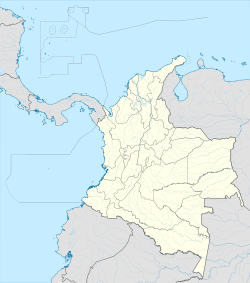Guasca
| Guasca | ||
|---|---|---|
| Municipality and town | ||

View of Guasca from the west
|
||
|
||
 Location of the municipality and town of Guasca in the Cundinamarca Department of Colombia |
||
| Location in Colombia | ||
| Coordinates: 4°51′57″N 73°52′38″W / 4.86583°N 73.87722°WCoordinates: 4°51′57″N 73°52′38″W / 4.86583°N 73.87722°W | ||
| Country |
|
|
| Department |
|
|
| Province | Guavio Province | |
| Founded | 21 June 1600 | |
| Founded by | Luis Enríquez | |
| Government | ||
| • Mayor | Miguel Arturo Garavito Diaz (2016-2019) |
|
| Area | ||
| • Municipality and town | 346 km2 (134 sq mi) | |
| • Urban | 8.8 km2 (3.4 sq mi) | |
| Elevation | 2,710 m (8,890 ft) | |
| Population (2015) | ||
| • Municipality and town | 14,759 | |
| • Density | 43/km2 (110/sq mi) | |
| • Urban | 5,203 | |
| Time zone | Colombia Standard Time (UTC-5) | |
| Website | Official website | |
Guasca is a Colombian town and municipality in the Guavio Province, part of the Cundinamarca Department located approximately 55 km from Bogotá passing through the town of La Calera, Cundinamarca or 65 km passing through Sopó. Guasca borders the municipalities Guatavita in the north, Junín in the east, in the south La Calera and Fómeque and in the west Sopó.
Before the Spanish conquest of the Muisca of the central highlands of the Colombian Andes, the Altiplano Cundiboyacense, the area was inhabited by the Muisca who spoke Chibcha. Guasca was ruled by a cacique who was loyal to the cacique of Guatavita. In the religion of the Muisca, the Siecha Lakes were considered sacred.
According to friar and Muisca scholar Bernardo de Lugo the name Guasca is derived from guâ, "mountain range" and shucâ; "skirt". The name thus means "skirt of the mountain range", indicating the position of the village with respect to the Eastern Ranges of the Colombian Andes.
Main economical activities of Guasca are agriculture; potatoes, carrots, flowers and strawberries and dairy farming.
...
Wikipedia


